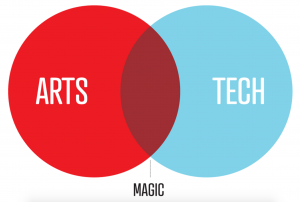Chances are that if you’re reading this then you are somewhere between mildly and wildly interested in transitioning into a career in technology sales. For me, it was the combination of magic and money that attracted me to high tech sales. Allow me to clarify. I wanted to be on the cutting edge of technology and work somewhere cool and young. And I also wanted to make decent money; and by decent, I mean a lot.
If you aren’t convinced, here’s a quick story that may help you see it differently. You may have heard of The Internet of Things (IoT); a buzzword that simply describes a recent trend of connecting everyday objects to the Web such as watches, thermostats and even eye wear (see Google Glass). General Electric  recently opened a new software division to get ahead of this digital and information renaissance and to centralize the technical programs for all 126 of its products, such as wind turbines. GE calls it the Industrial Internet; Cisco calls it the Internet of Everything; while other stalwarts simply refer to it as digital transformation. Regardless, more and more companies have begun to shift away from upselling more wind turbines and toward upselling web enabled sensors and data-driven cost savings. GE retrained its entire sales force to focus on long-term contracts and pay-for-performance based on IoT technology. And it feels like this is just the beginning.
recently opened a new software division to get ahead of this digital and information renaissance and to centralize the technical programs for all 126 of its products, such as wind turbines. GE calls it the Industrial Internet; Cisco calls it the Internet of Everything; while other stalwarts simply refer to it as digital transformation. Regardless, more and more companies have begun to shift away from upselling more wind turbines and toward upselling web enabled sensors and data-driven cost savings. GE retrained its entire sales force to focus on long-term contracts and pay-for-performance based on IoT technology. And it feels like this is just the beginning.
But many veterans with exemplary service records and loads of leadership experience get turned away for lack of experience – despite having the total respect and empathy of the very hiring managers turning them away. They say, “we just can’t take a risk on someone who hasn’t carried a quota before,” or “we would have to train her and that takes too much time and money.” All totally legit excuses.
So what do you do if you are a transitioning veteran trying to break into tech sales? Here are a few tips from my personal experience:
Go Big
Sometimes being a little fish in a big pond is the best way to acquire the skills you’ll need in sales. Industry leaders have the infrastructure and resources to put all of their new hires through world-class sales training. Well, some programs are better than others, but the one I went through was amazing. We went through an intense 12-week training curriculum that covered white boarding techniques, software demonstrations and objection handling. We even had some fun with an improv troupe to teach us how to think on our feet. It certainly helped me become a better sales professional, but it cost my company a lot of money. This is a cost that most start-ups and smaller companies cannot afford. So you may find that going to one of the big dogs is your best (and only) option.
Get Smart
Training can sometimes mitigate that gaping lack of experience on your resume. If you aren’t comfortable preaching the value of automation management or fog computing (that’s right, I said fog, not cloud), don’t be alarmed. There are plenty of resources out there to get some basic training – for free. The online learning platform, edX, allows any student anywhere to take online courses from 74 of the best colleges in the world.
For example, Professor Phil Laplante from Penn State University teaches Introduction to Cloud Computing that covers the basic concepts of one of the hottest and rapidly growing technologies. This would be the first class I’d take if I had to do it all over again. For more information on this edX course, visit http://bit.ly/1CxVVtD.
Network
Networking is a big part of breaking into a new role or industry. Here are a few resources for meeting like-minded professionals:
- Cisco Networking Academy (http://bit.ly/1ShjAzW)
- Google Veteran Resources (http://bit.ly/1TutBwn)
- Technology Sales Professionals LinkedIn Group: (http://linkd.in/1HoUkoK)
